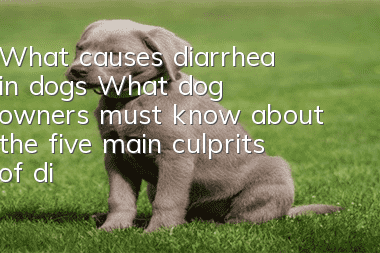What causes diarrhea in dogs? What dog owners must know about the five main culprits of diarrhea in dogs

Dogs have diarrhea because of infectious diseases
Common viral infectious diseases that cause diarrhea include puppies, corona dogs, etc. Many sellers say that the dog has been vaccinated once, but we don't know if they have been vaccinated. In addition, there is a latent period for virus proliferation in the body, and the vaccine may not have a protective effect during the latent period. Therefore, after a week of examination, it is best for the owner to return to the hospital for intensive immunization. Moreover, many sellers will deliberately say that the dog is older, but its actual age is much younger, so it is not a problem for the dog to be vaccinated in a short time.
Dogs’ diarrhea is caused by parasitic infection
Internal parasite infection is also an important factor in causing digestive tract problems in dogs, causing soft stools. For dogs that have not been dewormed, the first thing to consider is infections caused by digestive tract parasites such as coccidia, roundworms, and trichomonas. Parasites not only absorb the nutrients in the dog's body and occupy space in the digestive tract, causing indigestion, but they also run around in various organs in the body, causing great harm, so regular deworming is necessary.
Does have diarrhea due to other diseases
Gastroenteritis, pancreatic dysfunction, thyroid dysfunction and other diseases that may cause diarrhea should also attract attention, but these diseases usually show symptoms other than diarrhea. For other symptoms, it is best to go to the hospital to check and confirm what factors are causing it, and do not blindly take medication.
1. The incorrect method of changing dog food can cause the dog's intestinal tract to become unadapted and cause diarrhea.
2. Indigestion: The dog eats some foreign objects that are difficult to digest due to indiscriminate swallowing, causing the dog to suffer from indigestion and diarrhea.
3. Intestinal flora imbalance.
4. Stress response. Dogs are prone to this problem when they first arrive in a new environment.
What should I do if my dog has diarrhea?
The vast majority of owners who see their dogs becoming sparse will first give them some antidiuretic, which is incorrect. If puppies are rare, it is generally recommended to go directly to the hospital for examination and infectious diseases should be ruled out first. For adult dogs, you can consider whether it is gastroenteritis, eating the wrong thing, etc. If the diarrhea is not very severe, food can be cut off appropriately for 6 to 10 hours. During this period, a small amount of water can be given many times, and some probiotics can be considered for adjustment. If the diarrhea is severe and treatment is unsuccessful, it is best to send the patient to the hospital for examination as soon as possible.
- If a dog eats bones and ruptures its intestines, it will die within a few days.
- Dog's diarrhea looks like brown mud
- Can I use Yunnan Baiyao if my dog is lame?
- Is the blood in the dog's urine or stool serious or due to detoxification?
- Where to place the dog house can bring wealth. To remove yin and evil spirits, you must pay attention to the five elements numerology.
- Can puppies eat watermelon seeds?
- What medicine should Maltese dogs take when they have a cold?
- Can dogs eat mutton?
- What medicine should I take if my dog vomits and is shaking all over?
- Signs of a dog going crazy



